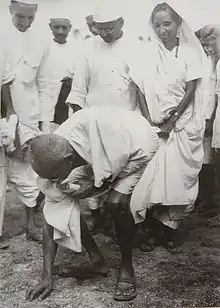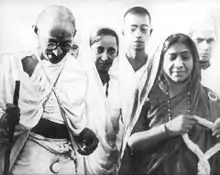Mithuben Petit
Mithuben Hormusji Petit (11 April 1892 – 16 July 1973) was one of the women pioneer Indian independence activists[1][2] who also participated in Mahatma Gandhi's Dandi March.[3][4]


Life
Born on 11 April 1892 into an affluent Parsi family in Bombay (now Mumbai), her father was Sir Dinshaw Maneckji Petit who was a well known industrialist and a Baronet.[5][6]
Indian independence movement
The young Petit was influenced by her maternal aunt who was a follower of Gandhi, and was the Secretary of the Rashtriya Stree Sabha.[7] Petit along with Kasturba Gandhi and Sarojini Naidu played a major part in the Salt March,[8] with Kasturba Gandhi beginning the march at Sabarmati, Sarojini Naidu lifting the salt for the first time at Dandi on 6 April 1930 and Petit standing behind Mahatma Gandhi when he repeated the violation at Bhimrad on 9 April 1930. The march was one of the most important event in the Indian independence movement.[1] In the time when women took a back seat (due to the patriarchal culture at that time in India) Petit was one of the three women who played a pivotal role in the march and the civil disobedience against tax on salt.[8] Petit participated in the Bardoli Satyagraha of 1928 which was a no-tax campaign against the British Raj where she worked under the guidance of Sardar Patel.[9] Petit was instrumental in the anti-liquor movement in India and spent time with Mahatma Gandhi and explained the liquor issue with the schedule tribes in Gujarat.[10]
Social work
Petit set up an ashram in Maroli called Kasturba Vanat Shala which taught underprivileged children from families of Adivasis, Harijans and fisher folk spinning, carding, weaving, dairy farming, leather-work and a Diploma Course in Sewing, to make the women self-sufficient.[11] She also opened a hospital of the same name for the treatment of mentally ill patients.[12]
She died on 16 July 1973.[6]
Recognition
Petit received the Padma Shri in 1961 for her social work.[13][14]
References
- Nawaz B. Mody (2000). Women in India's freedom struggle. Allied Publishers. ISBN 9788177640700.
- Mankekar, Kamla (2002). Women pioneers in India's renaissance, as I remember her: contributions from eminent women of present-day India. National Book Trust, India. ISBN 978-81-237-3766-9.
- "Mahatma Gandhi, Sarojini Naidu and Mithuben Petit". gandhiheritageportal.org. Retrieved 2 July 2017.
- Simmi Jain (2003). women pioneers in India's resistance. Kalpaz Publications. ISBN 9788178351742.
- Marzban J. Giara (2000). Parsi statues. Marzban J. Giara.
- Gawalkar, Rohini (28 September 2013). "पद्मश्री 'दीनभगिनी'". Loksatta (in Marathi). Archived from the original on 28 July 2017. Retrieved 28 July 2017.
- Suruchi Thapar-Björkert (2006). Women in the Indian national movement : unseen faces and unheard voices, 1930-42. SAGE Publications India Pvt Ltd. ISBN 9789351502869.
- "The Great Dandi March – eighty years after". thehindu.com. Retrieved 2 July 2017.
- Jain, Simmi (2003). Encyclopaedia of Indian Women Through the Ages: Period of freedom struggle. ISBN 9788178351742.
- "anti-liquor movement". mkgandhi.org. Retrieved 3 July 2017.
- "Trustees". Kasturbasevashram.org. Archived from the original on 3 January 2018. Retrieved 20 July 2017.
- "Kasturba Sevashram". kasturbasevashram.org. Archived from the original on 12 June 2018. Retrieved 20 July 2017.
- "Padma Shri in 1965 for social work". padmaawards.gov.in. Archived from the original on 28 July 2017. Retrieved 2 July 2017.
- "Mithuben Petit Padma Shri" (PDF). pib.nic.in/archive/docs. Archived from the original (PDF) on 28 July 2017. Retrieved 6 July 2017.